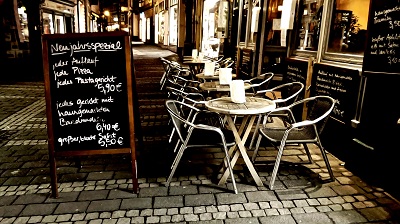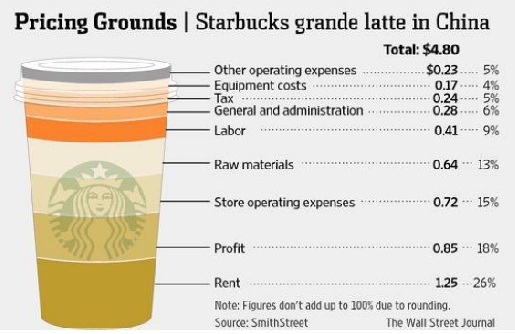The Chinese Coffee Conundrum
By Andrew Smith
 There is nothing quite like a nice, strong cup of coffee to give you a boost on those long, hard work days. If you were out on the town the night before, or you didn't manage to get much sleep amidst the all-too-frequent early morning firecracker fanfares, then the need for a brew or two increases several fold. Fortunately for us expats who live, work and play in the bigger cities, there are plenty of options when it comes to getting our daily fix of the black stuff.
There is nothing quite like a nice, strong cup of coffee to give you a boost on those long, hard work days. If you were out on the town the night before, or you didn't manage to get much sleep amidst the all-too-frequent early morning firecracker fanfares, then the need for a brew or two increases several fold. Fortunately for us expats who live, work and play in the bigger cities, there are plenty of options when it comes to getting our daily fix of the black stuff.
Aside from the cafes that are springing up everywhere around Tianjin nowadays, there are of course dozens of household names dispersed across the city. There are loads of Costas and Caffe Benes dotted around, but it is especially impossible to miss that great American brand that we all know and most of us love. In fact, within one square kilometre of the Nanjing Lu-Yingkou Dao intersection there are at least ten Starbucks.
Having such a plethora of options makes cities like Tianjin, Beijing and Shanghai a coffee craver's paradise. That is, until it comes to paying the bill. I dare say that there isn't an expatriate in town who hasn't, at some point, been struck by just how incredibly expensive a trip to the coffee shop is. It doesn't matter whether you are in a first-tier city or an upcoming third-tier town, the price of coffee seems to be outrageously high. It doesn't really matter which country you are comparing it to either. Not surprisingly, a nice cup of freshly-brewed coffee in most other Asian countries is much cheaper than it is here but, then again, in the UK, Canada or America you would still expect to save at least a dollar on a Starbucks' grande latte - the price in Beijing or Tianjin being almost five dollars a go.
There are several reasons why the seemingly over-inflated cost of coffee in China is baffling foreigners. First of all, there is the obvious fact, that unless you are importing a Ferrari or buying a condo in the capital city, China is an incredibly cheap place to live - particularly when you factor in how much money most expatriates earn. With notable niche exceptions-- like high-end European chocolates and cheeses - mass market food and drink products are particularly inexpensive compared to the Western world.
Then there is the issue of earning power. Basic economic common sense tells us that in a country where the average salary is relatively low, the price of products that are consumed in such large quantities wouldn't be anywhere near as high as they are at the moment. And while the demand for coffee beans is surging in the Middle Kingdom, it isn't as though they are a scarce resource. China's major trading partners in South America are swimming in the stuff. Vietnam, just next door, is now the world's largest coffee exporter. They could literally fling tonnes of the stuff into China via gigantic catapults.

So what is the answer behind this puzzling price phenomenon? After hours of searching online, and asking service staff at a couple of the well-known coffee houses, the answer seems to lie somewhere between high operating costs on the part of the major foreign brands and the knowledge that they can get away with charging the burgeoning Chinese middle class a hefty premium for their trendy products. According to an article in The Atlantic by Matt Schiavenza: "The coffee beans Starbucks brew in its Beijing stores, as well as other materials like cups and mugs, don't cost any more to import to China than in the United States. The problem is getting these materials from point A to point B. China has invested billions of dollars over the years to improve its port and transportation infrastructure, but the combination of taxes, fees, and middle-men add to logistics costs-which are then passed on to customers in the form of marked-up frappuccinos and lattes."
This may or may not but true for all of coffee shops in China, but it's the reason Starbucks are using. David Wolf, a public relations professional and expert in Chinese business, claims that the cost of "transporting coffee beans from, say, Colombia to the port in Tianjin is about the same as transporting them from Colombia to the port in Los Angeles. It's getting them from the port in Tianjin to the stores in Beijing that's expensive".
In all fairness, there probably is some truth to the operational costings narrative. It's no secret that multinational companies have been feeling the pinch of higher operating costs in China over the past few years, with everything from energy prices to wages creeping higher. But surely there has to be more to it than higher costs for the companies?
Another possible, or dare I say, probable factor in all of this is the country's booming coffee culture. While China has always been a nation that is famous for tea drinking, in recent years coffee has started to give the Middle Kingdom's classic beverage of choice a good run for its money. Over the past decade there has been a rampant influx of big international players vying for a piece of the pie. These firms have benefitted from the popularity of coffee-centric US television sitcoms such as Friends, as well as being Western and therefore chic in the eyes of many young, nouveau riche Chinese.
When you combine this with the enormous size of the customer base here in China, it is clear that even if the coffee shops threw a few extra kuai on all of their brews there would still be demand. Oddly enough, although there are now plenty of home-grown alternatives to the big international brands, very few of them seem interested in trying to be price competitive. In Ao Cheng and the surrounding area, there are many prime examples of this. In the last two or three years, many new Chinese-owned coffee shops have sprung up but, all-too-often, they end up charging the same, if not higher prices than the nearby Costa, Starbucks and Caffe Bene branches. Despite very few of them boasting either the same level of coffee quality or a comparable 'vibe', the owners, it seems, simply can't resist charging premium prices.
The sad truth is that until more cafe owners wake up and 'smell the coffee', these ridiculously high latte prices are here to stay.
---END---